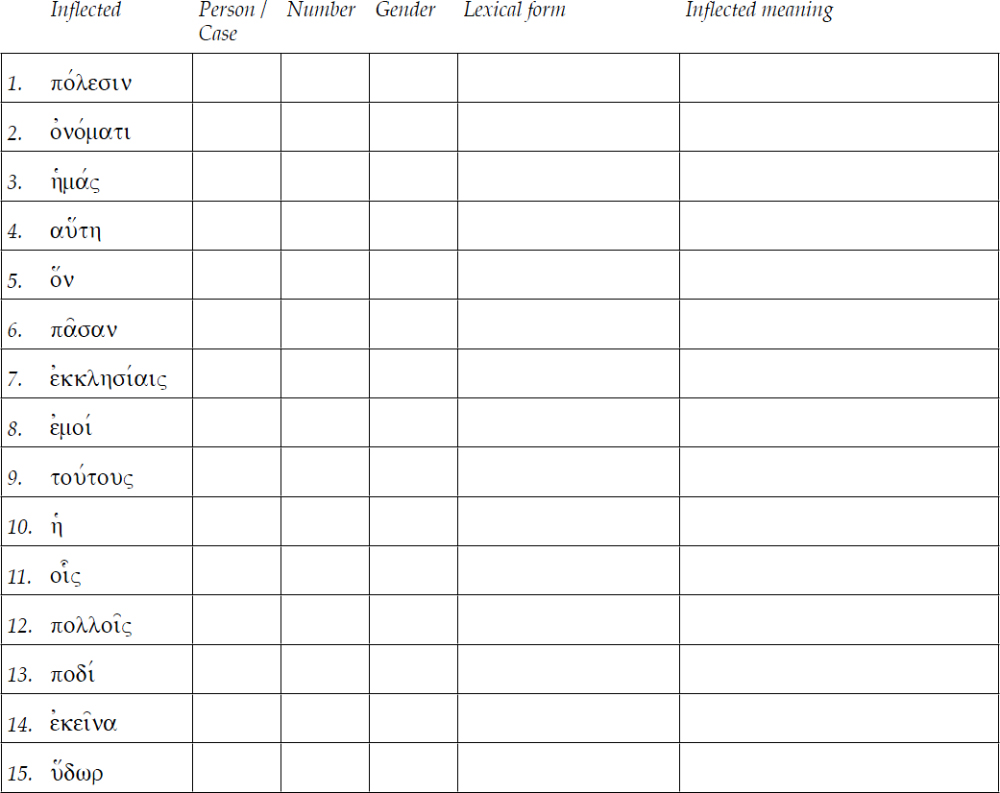Grammar
1. Explain how the stem was modified in the following inflected forms. Start by writing out the word’s stem, add the case ending, show the final form, and explain the changes.
a. σάρξ
b. ὄνομα
c. χάρισιν
d. πίστεως
e. πᾶς
2. Write out the seventh and eighth noun rules.
7.
8.
3. Describe what happens when you add a sigma to the following stops.
a. τ + σ ‣
b. β + σ ‣
c. δ + σ ‣
d. π + σ ‣
e. γ + σ ‣
f. κ + σ ‣
4. List the case endings

5. What determines the case, number, and gender of a personal pronoun?
a. Case
b. Number/gender
6. Write out the paradigm of the English personal pronouns.

7. What are the three uses of αὐτός?
a.
b.
c.
8. How do you distinguish the form of the feminine personal pronoun from the feminine demonstrative?
9. In what adjectival position will you find the demonstratives when they are modifying nouns?
10. What are the four basic rules of the vocative?
a.
b.
c.
d.
11. What determines the case, number, and gender of a relative pronoun?
a. Case
b. Number/gender
12. How do you distinguish the form of the relative pronoun from the article?
Parsing

Translation: 1 John 1:5 – 2:5
1:5 Καὶ ἔστιν αὕτη ἡ ἀγγελία1 ἣν ἀκηκόαμεν (we have heard) ἀπ᾽ αὐτοῦ καὶ ἀναγγέλλομεν (we proclaim) ὑμῖν, ὅτι ὁ θεὸς φῶς ἐστιν καὶ σκοτία ἐν αὐτῷ οὐκ ἔστιν οὐδεμία. 1:6 Ἐὰν εἴπωμεν (we say) ὅτι κοινωνίαν ἔχομεν (we have) μετ᾽ αὐτοῦ καὶ ἐν τῷ σκότει περιπατῶμεν (we are walking), ψευδόμεθα (we lie) καὶ οὐ ποιοῦμεν (we do) τὴν ἀλήθειαν· 1:7 ἐὰν δὲ ἐν τῷ φωτὶ περιπατῶμεν (we walk) ὡς αὐτός ἐστιν ἐν τῷ φωτί, κοινωνίαν ἔχομεν (we have) μετ᾽ ἀλλήλων καὶ τὸ αἷμα Ἰησοῦ τοῦ υἱοῦ αὐτοῦ καθαρίζει (he/she/it cleanses) ἡμᾶς ἀπὸ πάσης ἁμαρτίας. 1:8 ἐὰν εἴπωμεν (we say) ὅτι ἁμαρτίαν οὐκ ἔχομεν (we have), ἑαυτοὺς πλανῶμεν (we deceive) καὶ ἡ ἀλήθεια οὐκ ἔστιν ἐν ἡμῖν. 1:9 ἐὰν ὁμολογῶμεν (we confess) τὰς ἁμαρτίας ἡμῶν, πιστός ἐστιν καὶ δίκαιος, ἳνα ἀφῇ (he/she/it might forgive) ἡμῖν τὰς ἁμαρτίας καὶ καθαρίσῃ (he/she/it will cleanse) ἡμᾶς ἀπὸ πάσης ἀδικίας. 1:10 ἐὰν εἴπωμεν (we say) ὅτι οὐχ ἡμαρτήκαμεν (we have sinned), ψεύστην ποιοῦμεν2 αὐτὸν καὶ ὁ λόγος αὐτοῦ οὐκ ἔστιν ἐν ἡμῖν.
2:1 Τεκνία3 μου, ταῦτα γράφω (I write) ὑμῖν ἳνα μὴ ἁμάρτητε (you might sin). καὶ ἐάν τις ἁμάρτῃ (he/she/it sins), παράκλητον4 ἔχομεν (we have) πρὸς τὸν πατέρα Ἰησοῦν Χριστὸν δίκαιον· 2:2 καὶ αὐτὸς ἱλασμός5 ἐστιν περὶ τῶν ἁμαρτιῶν ἡμῶν, οὐ περὶ τῶν ἡμετέρων6 δὲ μόνον ἀλλὰ καὶ περὶ ὅλου τοῦ κόσμου.
2:3 Καὶ ἐν τούτῳ γινώσκομεν (we know) ὅτι ἐγνώκαμεν (we have known) αὐτόν, ἐὰν τὰς ἐντολὰς αὐτοῦ τηρῶμεν (we keep). 2:4 ὁ λέγων (one who says) ὅτι ἔγνωκα (I have known) αὐτὸν καὶ τὰς ἐντολὰς αὐτοῦ μὴ τηρῶν (is keeping), ψεύστης ἐστὶν καὶ ἐν τούτῳ ἡ ἀλήθεια οὐκ ἔστιν· 2:5 ὃς δ᾽ ἂν τηρῇ (he/she/it is keeping) αὐτοῦ τὸν λόγον, ἀληθῶς ἐν τούτῳ ἡ ἀγάπη τοῦ θεοῦ τετελείωται (he/she/it has been perfected), ἐν τούτῳ γινώσκομεν (we know) ὅτι ἐν αὐτῷ ἐσμεν.

Codex 2882 is a Greek manuscript of Luke’s Gospel. The manuscript, which is only 46 leaves (92 pages), was previously owned by a man who came from Greece to America in the early decades of the twentieth century. After he died, the manuscript was purchased by a rare book and manuscript store in Pennsylvania. It was then purchased in 2005 by the Center for the Study of New Testament Manuscripts (www.csntm.org, used here by permission). The manuscript was registered with the Institut für neutestamentliche Textforschung (the Institute for New Testament Textual Research) in Münster, Germany in January 2008 and given the number 2882.
The codex is a 10th-11th century manuscript, relatively early as far as Greek New Testament manuscripts go. The passage in the photograph is from Luke 1:21–34. The opening line is the first part of verse 21: “Now the people were waiting for Zechariah.” The last line of this page says, “And his kingdom will never end” (verse 33). This is followed by the first word of verse 34, “said” (as in “Mary said”).
The image shows the “hair side” of the parchment. The sides of the animal skin were typically matched for aesthetic reasons so that facing pages would either be hair side (outside of the animal) or flesh side. The hair follicles are clearly visible in the image.